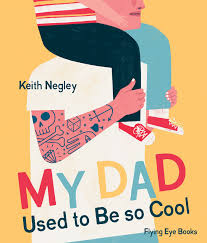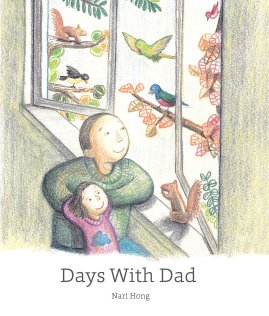Not all picture books are bright and happy. Kids have a wide range of emotions and experiences, and there are books for all of them. Or pretty much all of them, in any case. There are picture books about being sad, and there are picture books about things that will make you sad.
This post isn’t about those books. This post is about picture books that I am pretty sure are not meant to make anyone sad. I might be an outlier in finding these books sad. You’ll have to read them yourself and be the judge of the subjective sad level contained in these volumes.

My Dad Used to Be Cool by Keith Negley
Here is a book about a dad who used to have punk hair and play in a band before he became a dad. Not that he’s a dad, his hair is short and he doesn’t have time for the music. The reviews of this book all seem to find this sweet –praising the depiction of the sacrifices parents make—but when I read it, I am reminded of the way our culture seems to require parents (especially moms, but also dads as in this book) to give up their identities and hobbies when they have kids. Love music? Try Raffi. Counterculture style? Not gonna work. It makes me sad, honestly. I know not everyone conforms. There are some punk parents out there doing their own thing, and there are parents who play music or indulge in other passion projects. But those are the minority. Most people are like the dad in this book. We used to be someone; Now we’re someone’s parent. So I guess it’s relatable content, but it’s sad relatable content, in my opinion.

Days with Dad by Nari Hong
This is a book I really wanted to love. There are so few picture books that show disabilities at all, much less a disabled parent, that I wanted to be able to recommend this one widely since it features a dad who is a wheelchair user with his daughter. Unfortunately, the book is one long string of apologies from the dad for all the things he cannot do. The semi-autobiographical text is meant to be feel-good though, because the little girl replies with a positive bit after every apology. Can’t ice skate? No problem, you can lace up my skates for me. Over and over again. I see the attempt at optimism, and I raise you with this: Why did we need a picture book version of internalized ableism? Yeah, I get that probably a lot of disabled folks feel like they are a burden or a disappointment to their loved ones on occasion, but that is a sad thing about our culture. That’s not a “cheer up, pal” kind of thing. That’s an actually really sucky thing that many of us, myself included, fight within ourselves because our culture tells us we’re less than we should be. That’s not uplifting to me, folks. It’s sad.
I feel bad that both of these books are dad books. Stay tuned for a future post sharing dad books that don’t make me sad.













